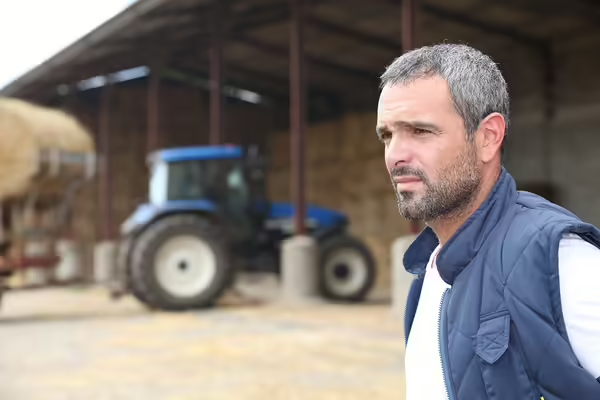
DECATUR, Ill. – On a farm, most pressures are constant and uncontrollable. Machinery breaks, weather delays work and commodity prices fluctuate. The work is isolating and stressful, which puts farmers at risk for severe and ongoing anxiety. Suicide rates are higher for farmers than any other occupation, according to the Centers for Disease Control.
“We know it’s a problem in the population, and we know access to mental health care is not always available in rural areas,” said Josie Rudolphi, assistant professor of agricultural and biological engineering at University of Illinois. Rudolphi notes, from a previous study she conducted, that up to 60% of young farmers and ranchers reported at least mild symptoms of depression and 70% reported at least mild symptoms of anxiety.
Rudolphi will lead a free webinar from noon to 1 p.m. CST Thursday, February 6 on the topic of Farm Stress and Impact on Health. Participants can access the webinar from any computer or mobile device with internet access. Sign up at go.aces.illinois.edu/SmallFarmWinterWebinar.
The agricultural landscape is also changing rapidly leading to a lot of uncertainty. Farmers are aging – 62% of Illinois farmers were 55 or older, according to the USDA 2017 Census of Agriculture. They also have more intense business management responsibilities and they face continued pressure to keep up with technological and production advances. Add to this list everyday family issues, health concerns and financial worries – and it is no wonder the National Safety Council ranked agriculture as one of the top two most hazardous occupations.
“Between prices and trade wars, this has been an extremely stressful year for Illinois farmers,” said Illinois Extension Local Foods and Small Farms Educator Doug Gucker.
Chronic stress can take a huge toll on a person’s physical and mental health. It can lead to depression, anxiety and even suicidal thoughts or action. Prolonged stress diminishes problem-solving abilities. And on a farm, poor decision making can lead to injury.
“Current research in brain health indicates that exposure to prolonged stress can cause long-term changes in the brain including brain structure and function, which could lead to poor emotional regulation and impaired thinking,” said Karla Belzer, University of Illinois Extension Family Life Educator.
Some symptoms of stress include:
- Physical – Muscle aches, frequent headaches, frequent upset stomach and fatigue.
- Behavioral – Difficulty sleeping, irritability and easy to anger, inability to focus, difficulty making decisions and increased use of alcohol/drugs.
- Emotional – Feelings of anxiety, panic, frustration, impatience, restlessness, isolation, hopelessness and discouragement.
- Relationship – Communication difficulties and maybe conflict with family members and friends, strained interactions, avoidance of others and verbal or physical outbreaks.
Everyone handles pressure and copes with stress differently. Feelings of emotional distress, anxiety, depression, anger, suicidal thoughts, and substance abuse are all potential warning signs. Sometimes people aren’t aware of the warning signs, some ignore them, and some have become so accustomed to them that they don’t realize the danger they are in. Others may be concerned about mental health stigmas.
People in rural communities are willing to help others, but rarely ask for favors or seek professional help. It is not always easy or comfortable to ask someone how someone is doing in stressful times, but more often than not, people will feel relieved that someone noticed, that someone cares. This might be all it takes. A recent study at U of I found that mental health information in rural areas is best delivered face-to-face, from family and friends.
“Farmers want information from their innermost circle,” Rudolphi said. “Equipping those people with as much information as possible to deal with the stress and subsequent mental health issues of our farmers is important. These results really help us inform dissemination and creation of future resources.”
Contact
Doug Gucker
Extension Educator, Local Food Systems and Small Farms
Macon Extension Office
3351 N. President Howard Brown Blvd., Decatur, IL 62521
(217) 877-6042
Source: Doug Gucker, CCA, University of Illinois Extension, Local Food Systems and Small Farms serving DeWitt, Macon, and Piatt Counties, (217) 877-6042, dgucker@illinois.edu. News Writer: Emily Steele, Publicity Promotion Associate.